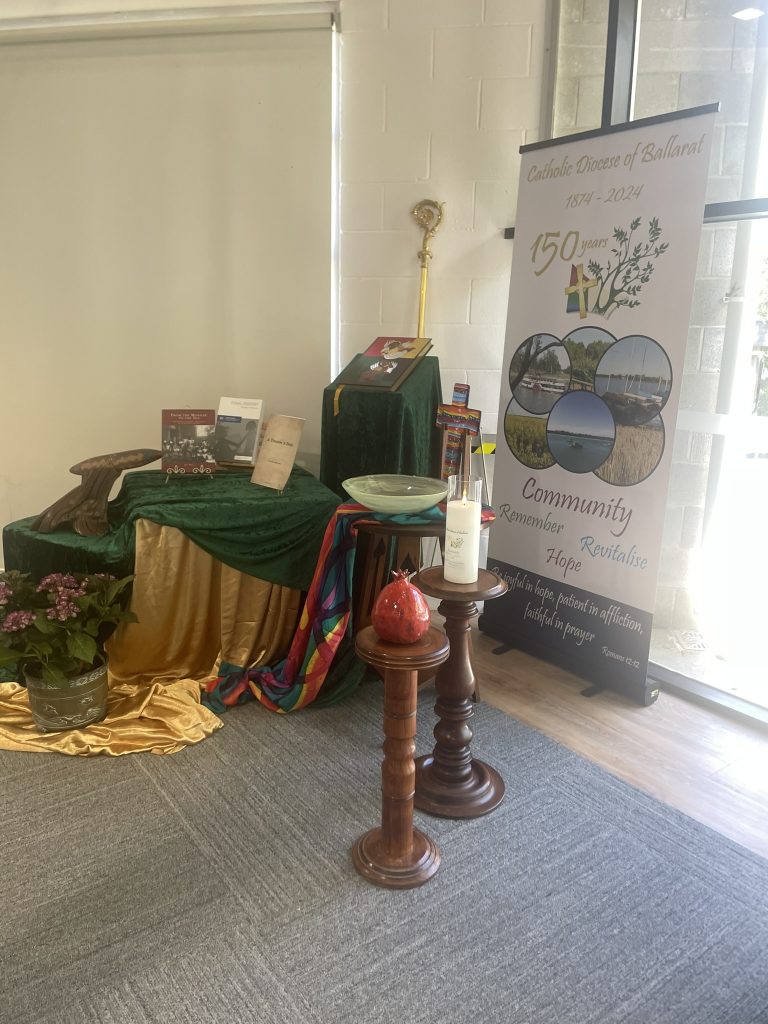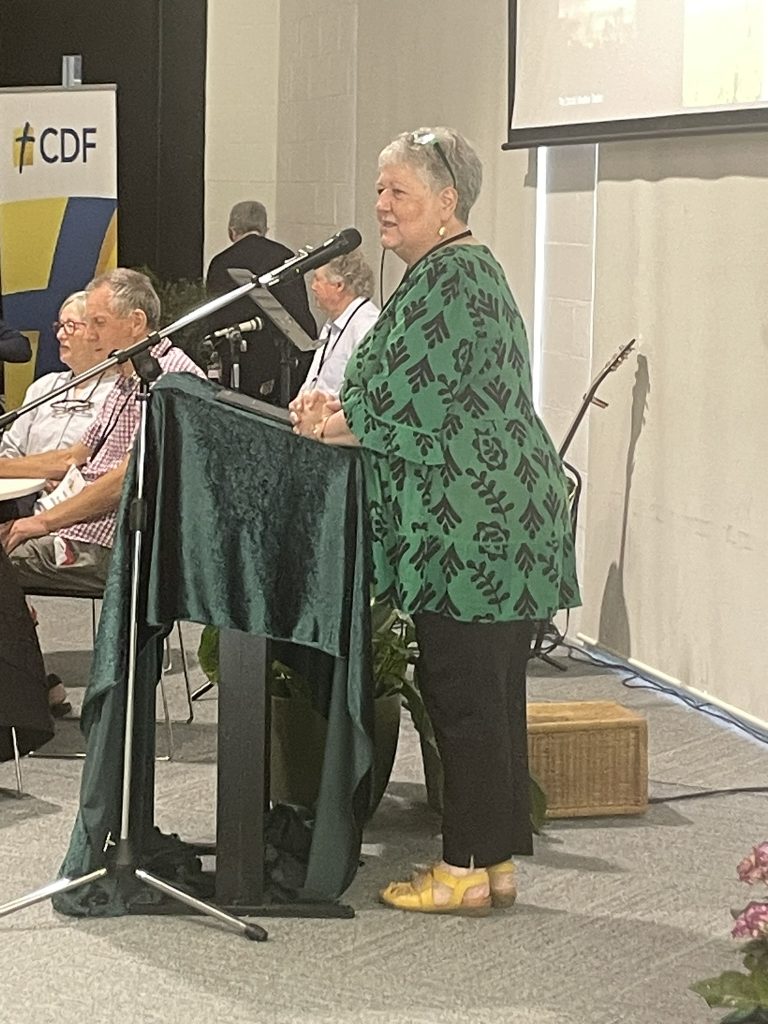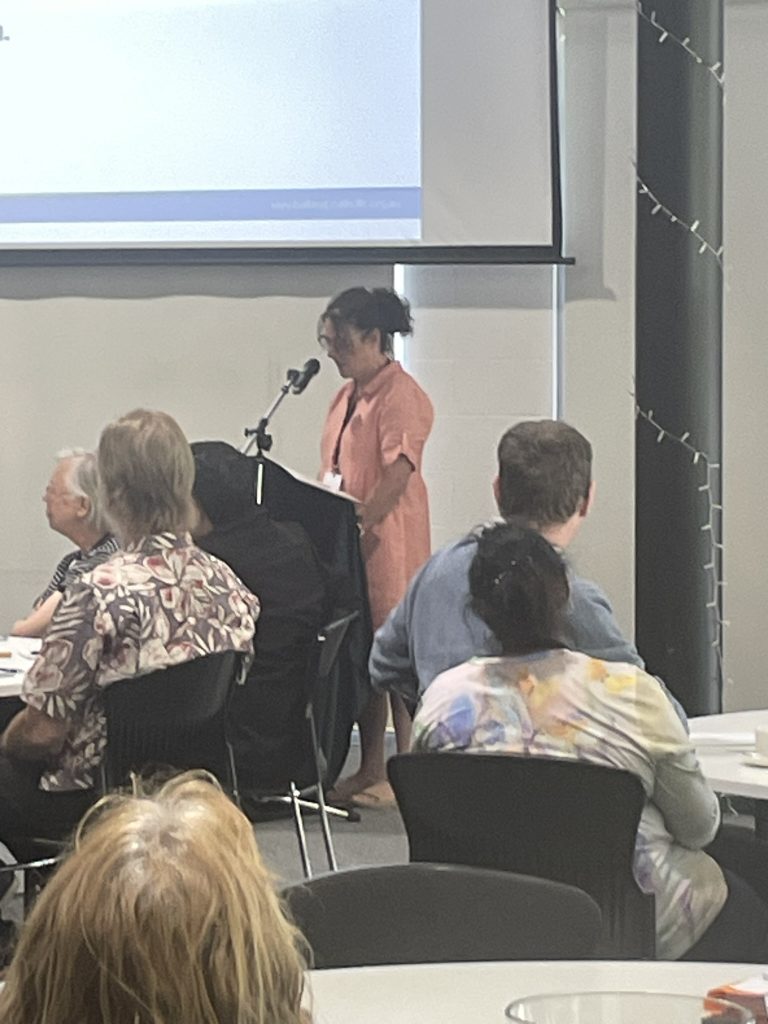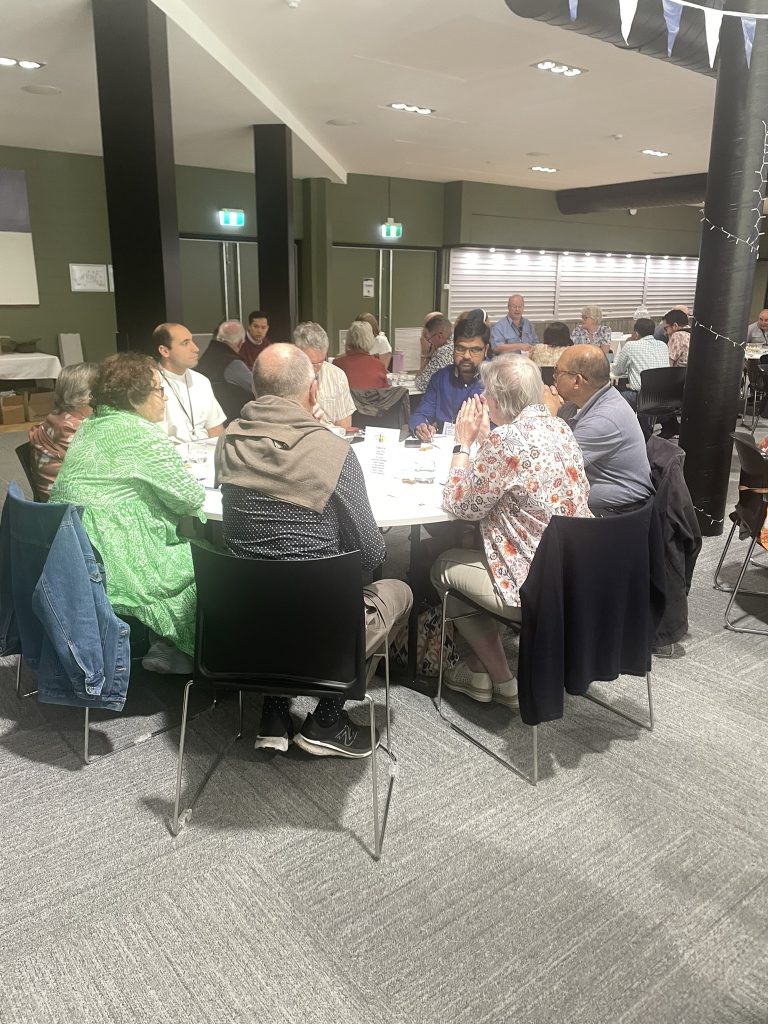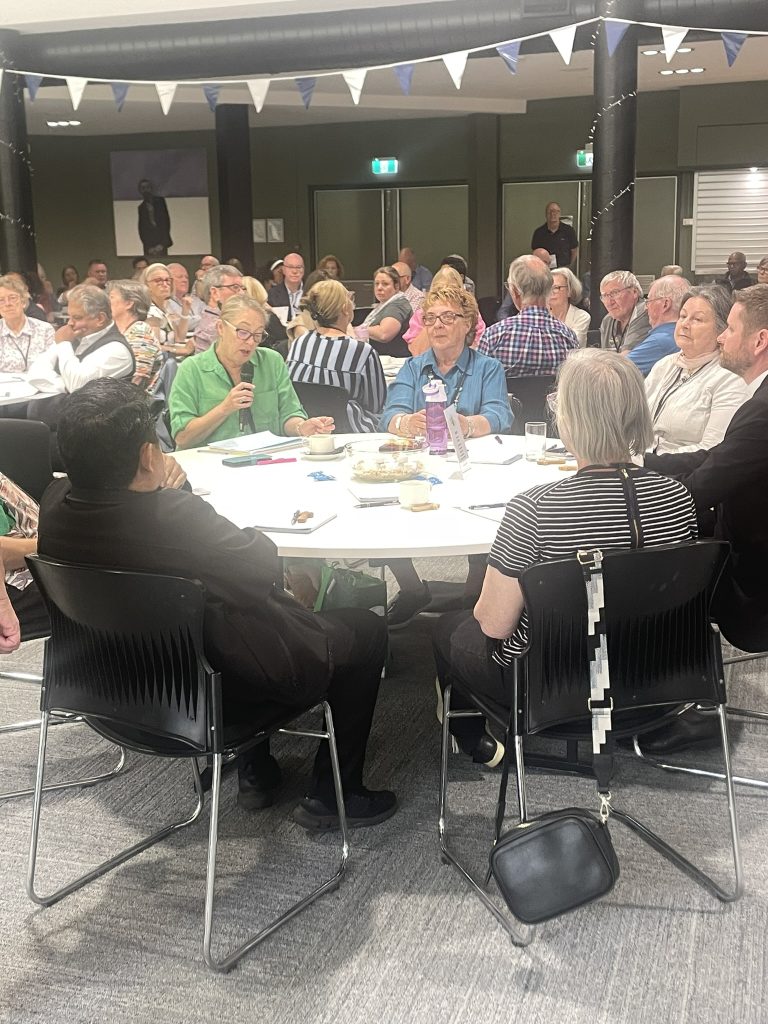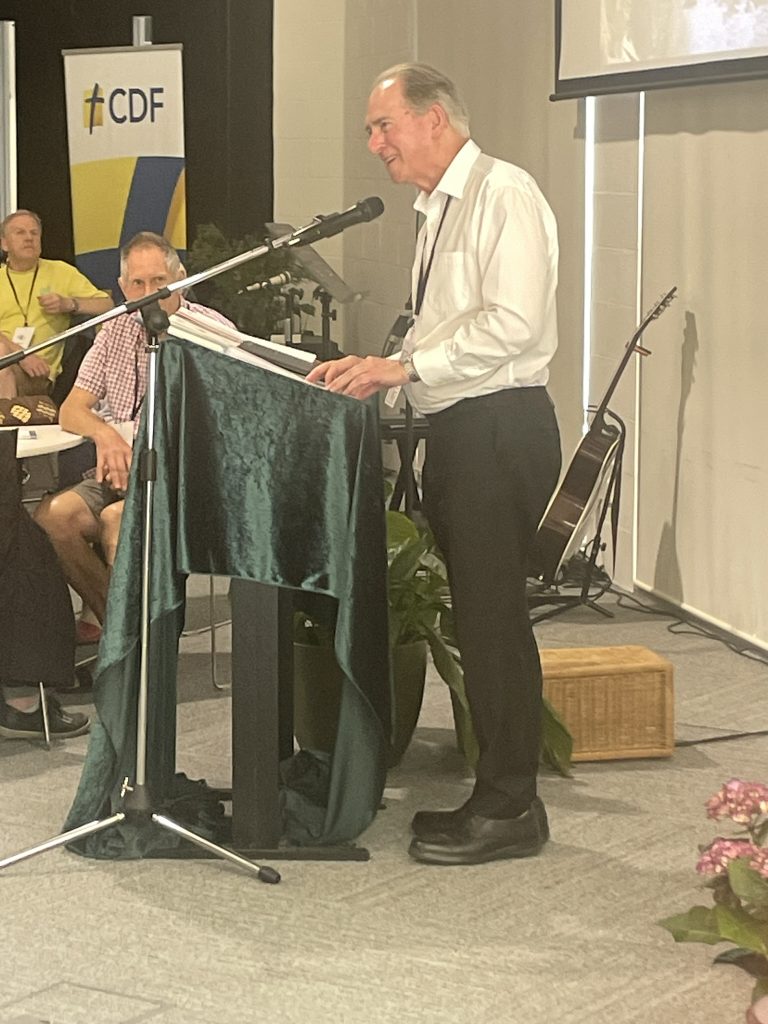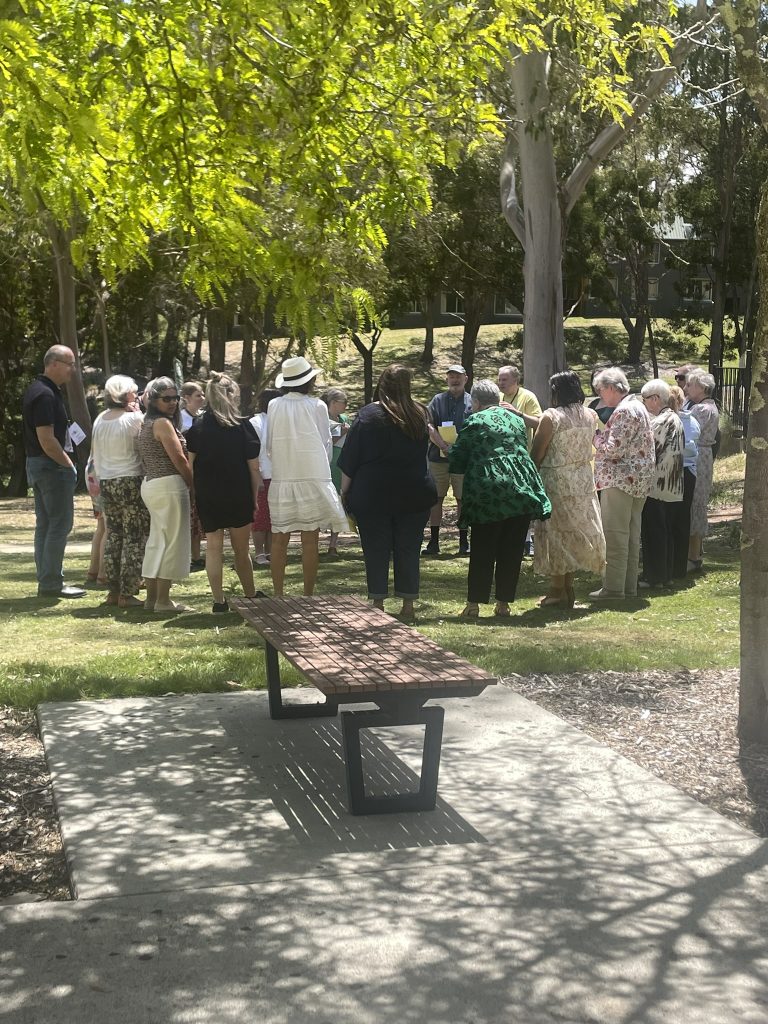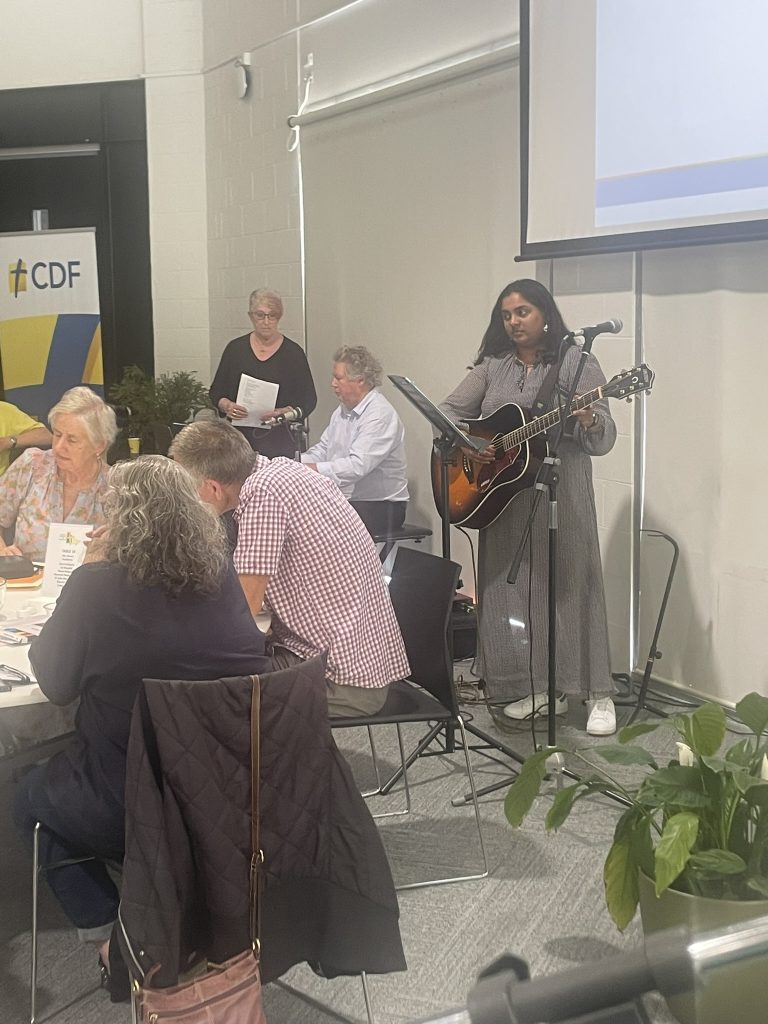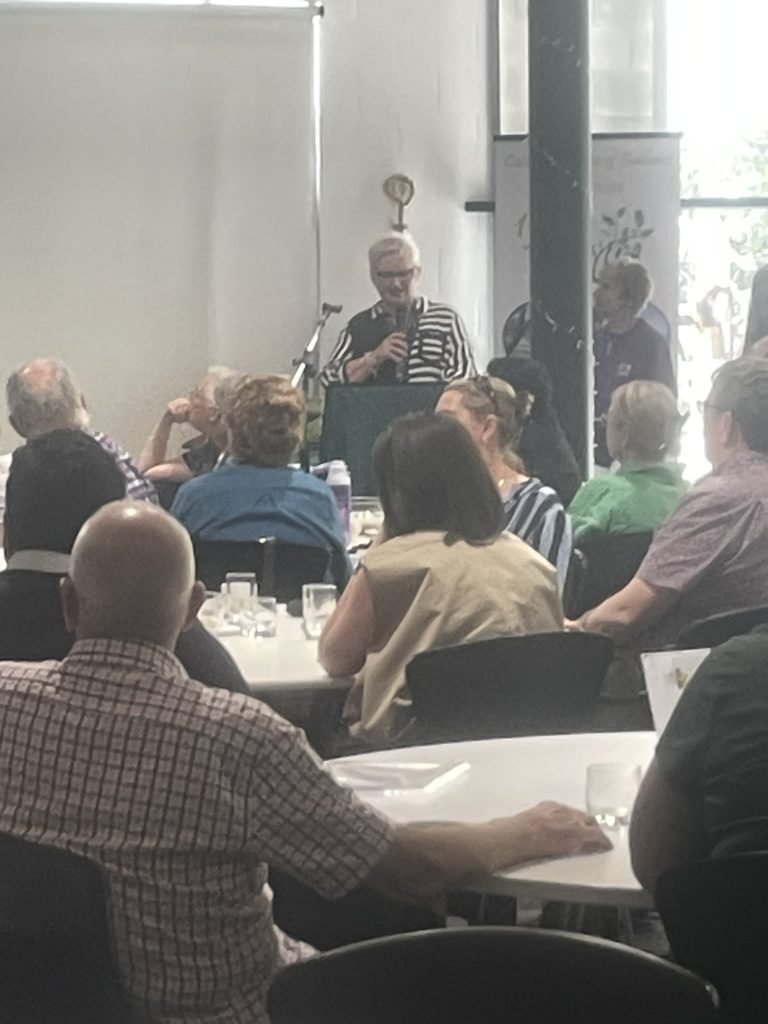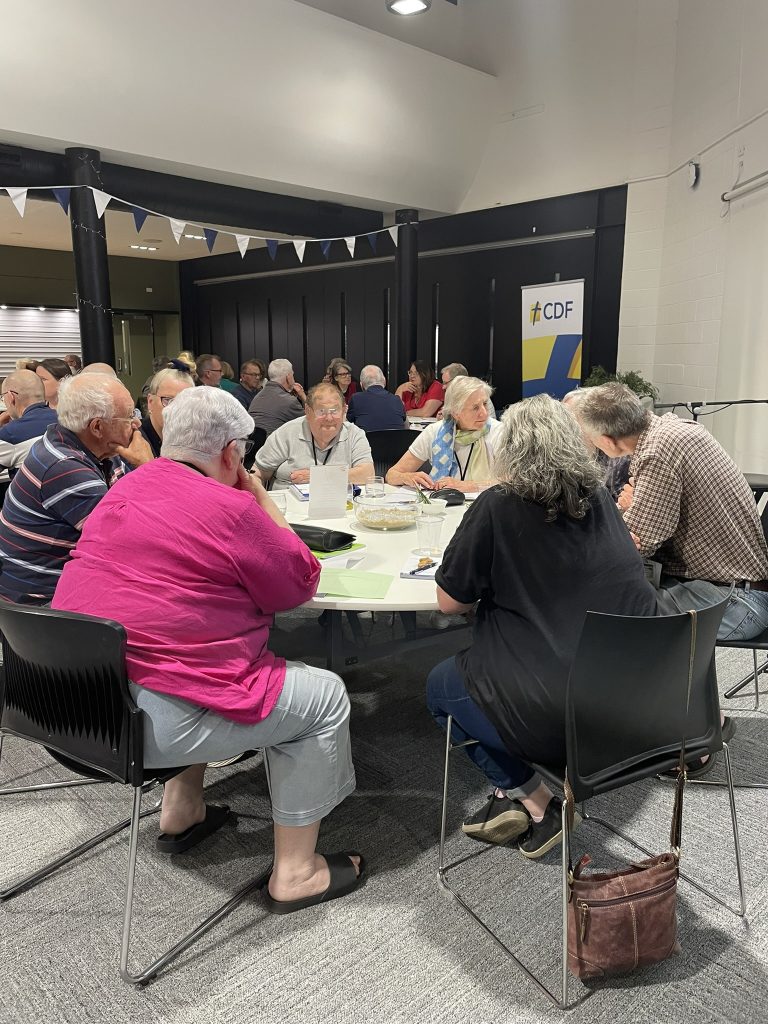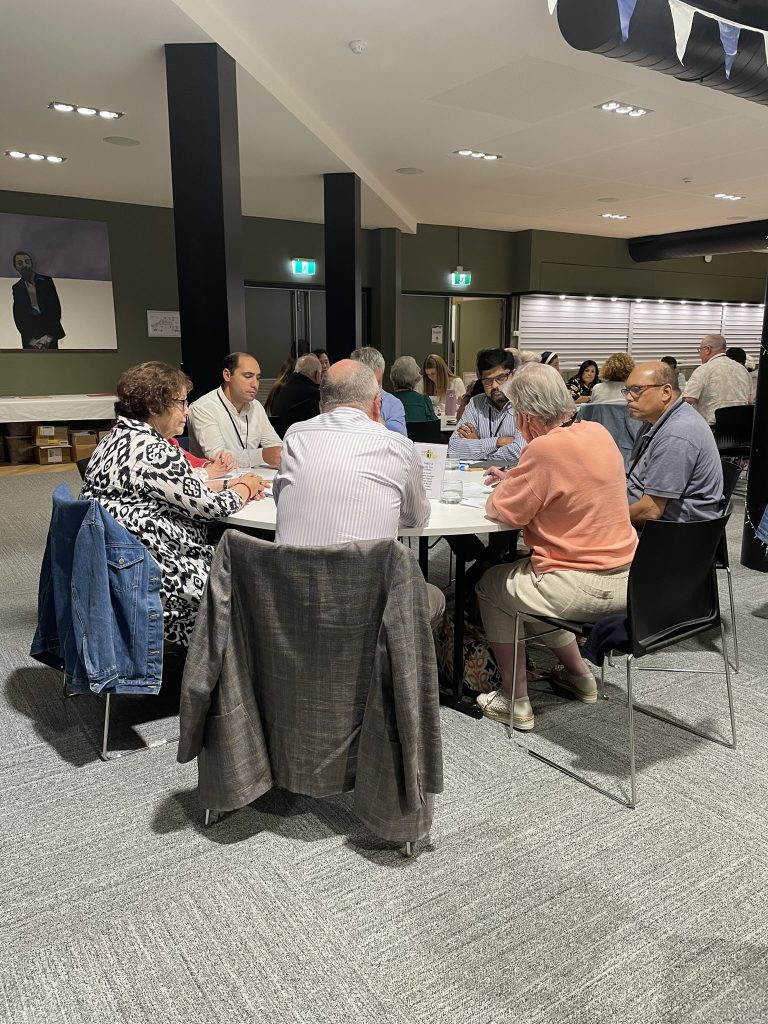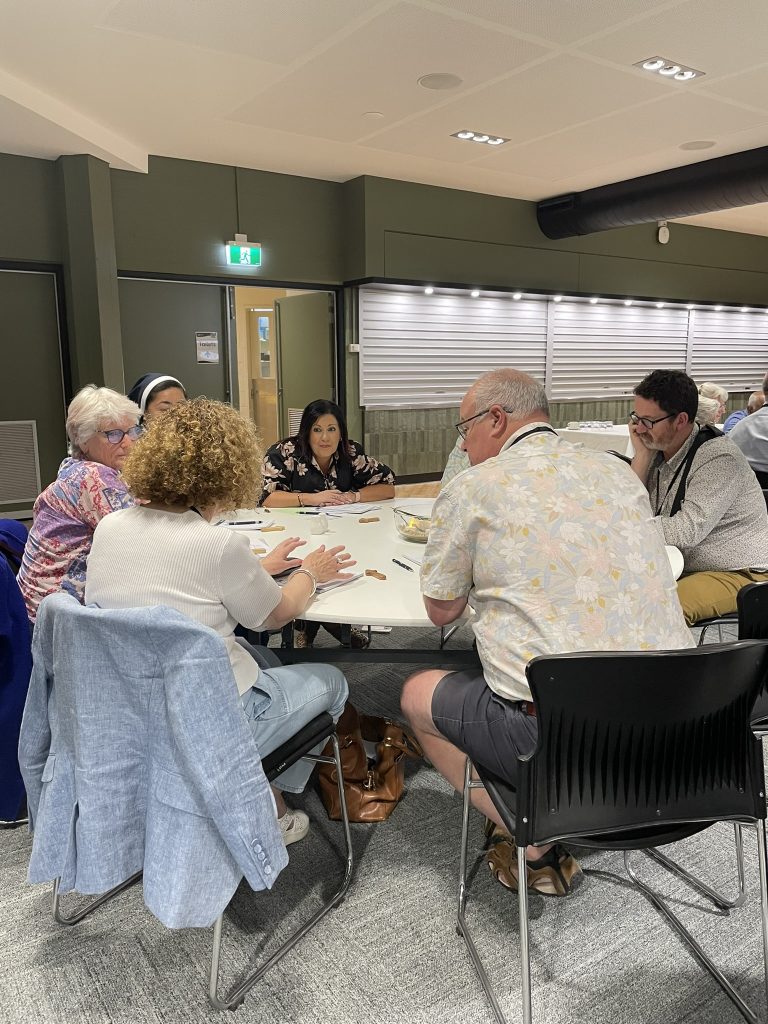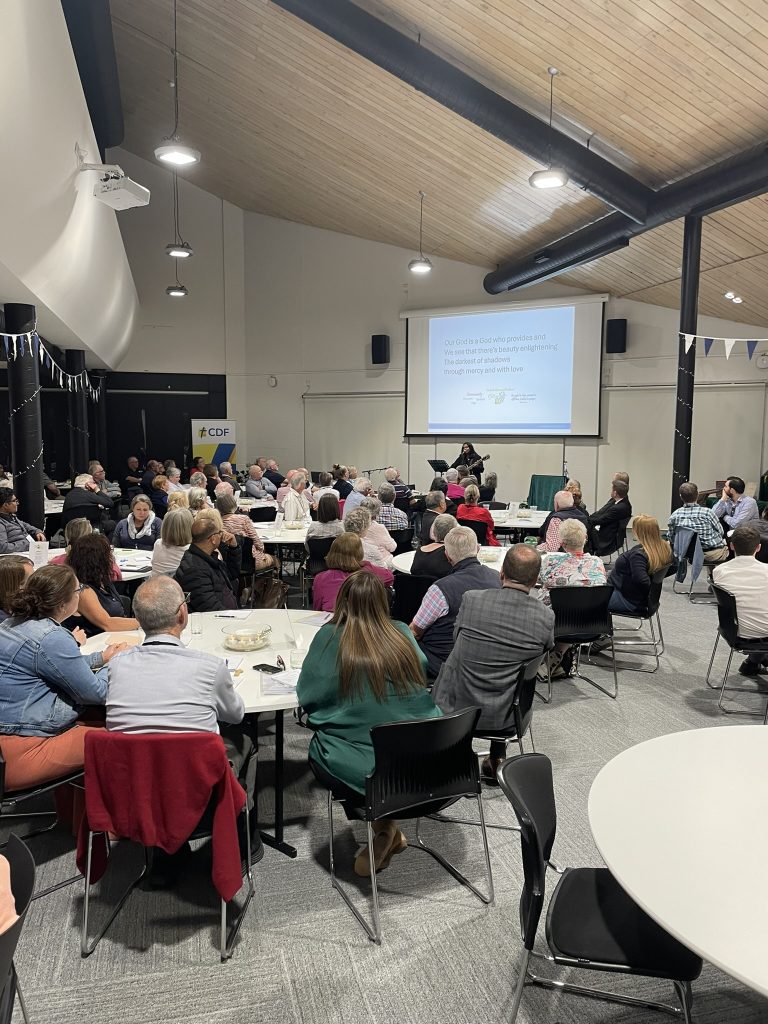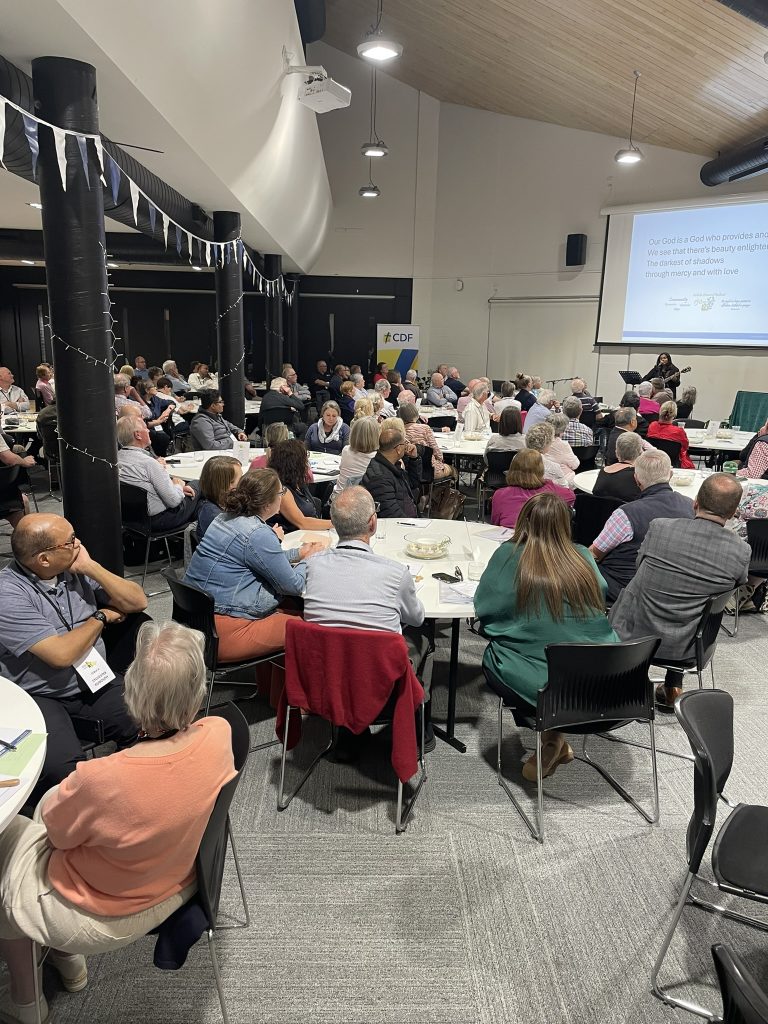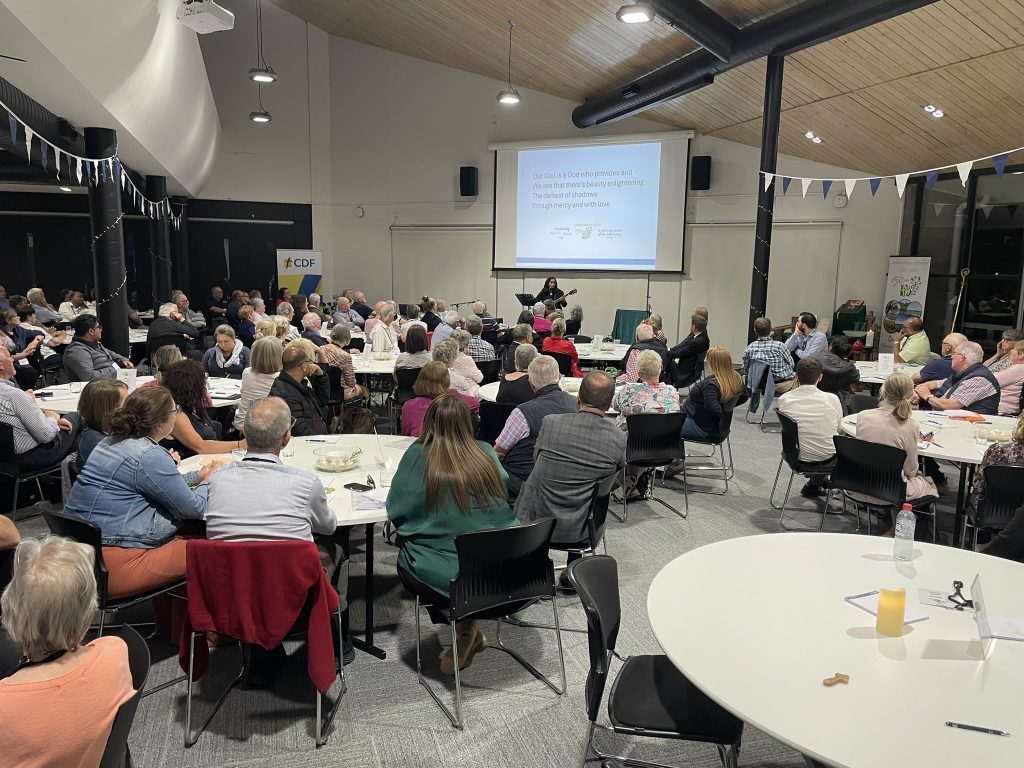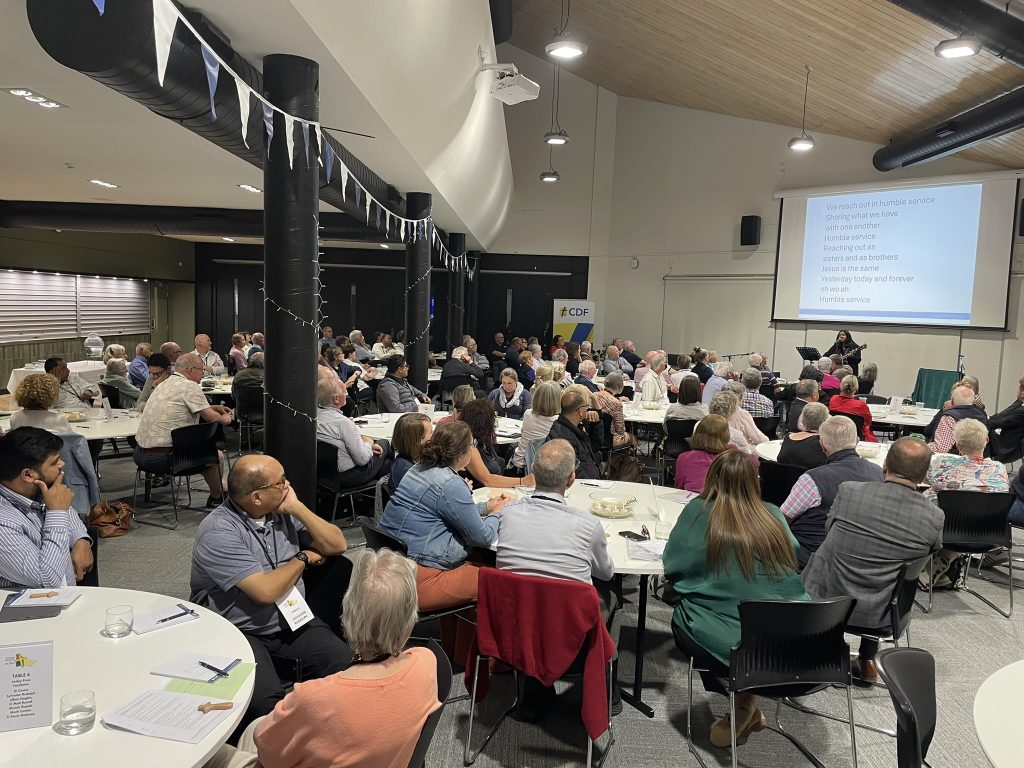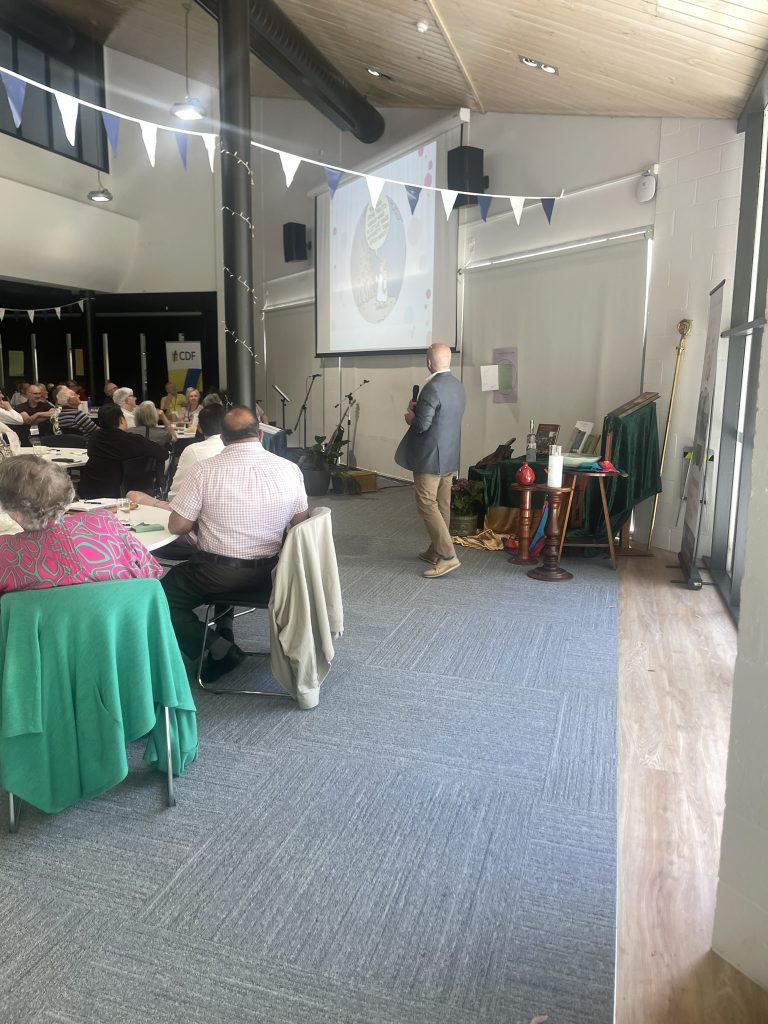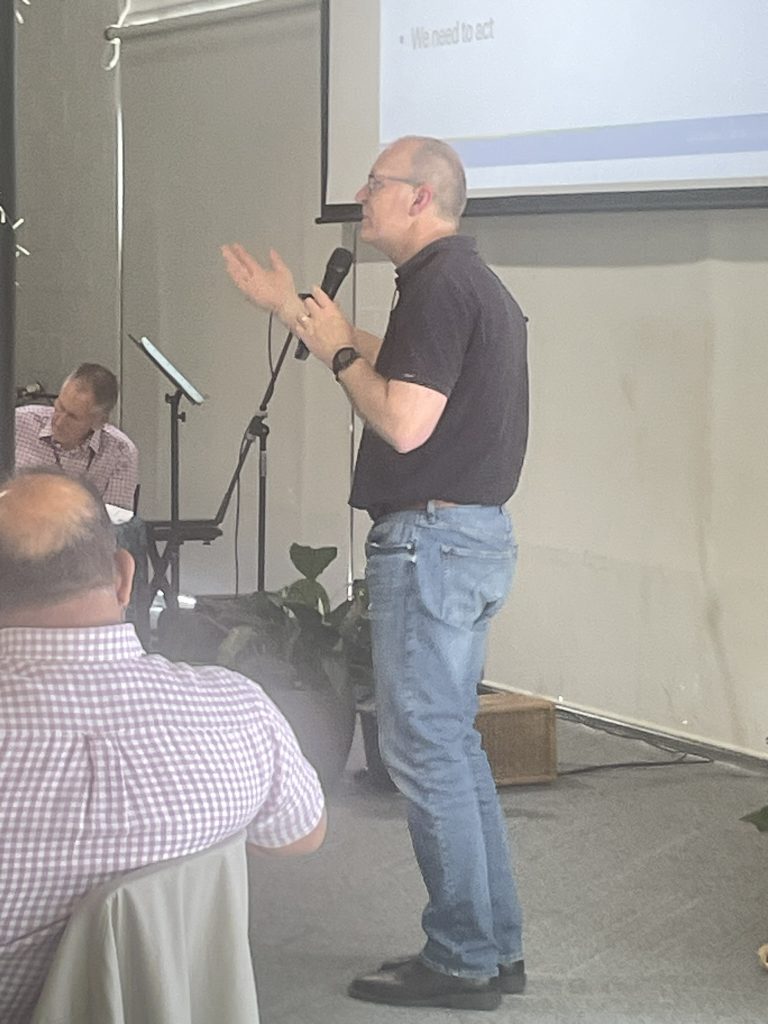Excitement, hope and anticipation were a few of the feelings experienced on November 15 and 16 with the gathering of people from around the Diocese of Ballarat for the first Diocesan Assembly in many years.
The Diocesan Assembly commenced with registrations on Friday evening in the Albert Coates Complex, Federation University, Mt Helen in Ballarat followed by a light meal with the assembled gathering at their designated tables for the opening of the Assembly.
Jenna Oldaker performed the Welcome to Country. Jenna is a Wadawurrung Traditional Owner and visual artist creating works under ‘Murrup Art’. ‘Murrup’ is the Wadawurrung word for spirit, which is fitting as Jenna’s art comes from the sacred tradition of storytelling told by her ancestors and their spirits.
The gathering was called to prayer following the Welcome to Country by the song ‘Gather Us, O God’ along with a procession that included:
- Bishop Paul – with the Crozier that was Bishop Moore’s from the 1880’s
- Terry Harney – with the book “From the Murray to the Sea – Catholic Education in the Diocese of Ballarat’.
- Michael Myers – with the Report of Royal Commission into the Sexual Abuse of Children by Clergy and Church Personnel.
- Sr Veronica Lawson – with the Documents of Vatican II
- Marie Shaddock – with the Book of the Gospels
- Michelle Kearney – with water from the sea at Portland
- Sr Telesia Ta’avao – with water from Lake Wendouree
- Nancy Summerhayes – with water from the Murray River at Mildura
- Maria Noonan – with the symbol of the pomegranate
- Bernadette Lynch – with the 150th Anniversary Logo and history
- Megan Ioannou – with Message Sticks
Bishop Paul commenced by calling by name the parishes, places and ministries that have delegates in attendance:
From its people who are delegated from its parishes from the Murray to the Sea –
Sunraysia, Ouyen, Northeast Mallee, East Wimmera, Wimmera-Mallee, Gariwerd, Maryborough, Creswick, Daylesford, Wendouree, Ballarat, Ballarat North, Beaufort, Ballarat East, Bungaree, Gordon, Redan, Linton, Sebastopol, Western Border, Hampden, Camperdown, Timboon, Cororooke, Colac, Apollo Bay, Southwest Coast, Portland;
From services of Catholic education in the Diocese who are delegated from the Diocese of Ballarat Catholic Education Limited, Edmund Rice Education Victoria, Mercy Education, Missionaries of the Sacred Heart and Australian Catholic University;
In Social Services – CatholicCare, CatholicCare Housing and St Vincent de Paul;
In Health and Aged Care – St John of God Healthcare, Mercy Place Aged Care, Nazareth House;
In the Agencies and Offices – Caritas, Catholic Mission, Marriage Tribunal, Pastoral Ministry and Professional Standards;
In its Boards, Councils, Commissions and Panels – Finance, Foundation, Liturgical, Pastoral Planning, Personnel Advisory, Professional Standards and Social Justice;
Through the Religious Congregations – the Brigidine Sisters, Good Samaritan Sisters, Missionaries of the Sacred Heart, Missionaries of St Thomas the Apostle, Oblates of St Joseph, Sisters of Mercy and the Sisters of Nazareth;
The Priests and Deacon, ordained for and incardinated into the Diocese of Ballarat;
Facilitators and planning team who will serve the workings of this Assembly.
Once all were standing, ‘Together we Build our Place’, one of the 150th Anniversary songs was sung and the candles on the tables were lit and placed in the bowl in the centre of the table.
Deacon Cay Trinh (now Fr) proclaimed the Gospel – Matthew 20:25-28. After the Gospel, Bishop Paul blessed the water brought forward from across the Diocese of Ballarat and facilitators come forward to receive bowls of water to sprinkle the delegates at their table.
The anniversary prayer was prayed and then Bishop Paul introduced Sr Karon Donnellon rsm as the facilitator for the Assembly. In Bishop Paul’s introduction of Sr Karon, he mentioned that because a diocesan assembly is a rare event, it is useful to have someone to guide us in how we conduct the meeting.
Sr Karon has experience in facilitating meetings of various groups of people. She also knows our diocese, having grown up in the Donald district. Sr Karon joined the Ballarat East Congregation of the Sisters of Mercy. She has served as a secondary teacher, diocesan youth director, juvenile justice chaplain, and director of mission for Catholic Social Services Victoria. She is currently the Institute Leader for the Sisters of Mercy of Australia and Papua New Guinea.
The first session considered the focus of the Assembly – Leadership and Governance and presenters were Fr Justin Driscoll, Maria Noonan (CEO St John of God Ballarat and Warrnambool) and Lucy Darcy (Moderator of the Parish of Cororooke and Diocesan Foundation member).
The distinction between leadership and governance was an emphasis. This process is an invitation to allow the transformational to be central to the experience and encouraging and leading our communities to the next step. A sense of inspiring people for the future, whatever that may be. How can authority and responsibility be understood and exercised such that it serves the participation of the whole People of God? What renewal of vision, and forms of concrete exercise of authority, responsibility and governance, are needed in order to grow as a missionary synodal Church?
Out of listening, three key lessons have emerged. Trust has to be restored; we need to re-examine attitudes to power and authority in the Church; and the Catholic community feels it faces significant uncertainty.
Sr Karon’s presentation in this session considered the Synod on Synodality which states that Synodality is a “constitutive dimension of the Church.” Three points which Sr Karon offered included –
Lay Participation: It calls for their increased presence in synodal assemblies and all phases of ecclesiastical decision-making. New procedures for selecting and evaluating bishops and expanded lay participation in diocesan leadership and canonical processes are proposed.
Women’s Leadership: The document explicitly states there is “no reason or impediment” to prevent women from assuming leadership roles in the Church. The text advocates for increased female participation in clergy formation and broader involvement in Church decision-making processes.
The National Catholic Register also states: The end goal is to make the Church more effective at evangelisation by making it more participatory and inclusive.
Sr Karon then outlined the Synodal Process as follows:
- To pause, centre and tune one’s ear and heart to the other,
- This is a way of being together that opens us to perceiving the in-breaking of the Divine within a community. As Jesus said, “Where two or three are gathered ”.
- Listen without thinking about what you will say, letting your next thoughts emerge from the silence,
- Allow what another has said to stimulate your thinking in order to build bridges of connection in the circle to create shared meaning,
- Keep a spacious hospitality to explore differences.
The delegates, with the assistance of the table facilitator were asked to consider the following questions:
What are you hoping for from the assembly?
What are your concerns?
They did this as part of the Synodal Process – a Conversation in the Spirit –
Part One:
Silence
Part Two:
Each person is invited to share their reflection on the two questions.
Part Three:
In the light of the sharing what is rising in you for further conversation
Part Four:
On the sheet provided write the reflections you wish to share with the whole Assembly
Following this, there was a brief presentation with a word from a sponsor – Steve Bigarelli, Chair of the Catholic Diocese of Ballarat Foundation spoke about the works of the Foundation. The Foundation sponsored the Assembly and Steve promoted the understanding of the Foundation.
The evening concluded with Gerry Vytilingam singing a song written for the 150th anniversary, ‘Humble Service’.
Saturday morning began with prayer before going into the first session. Sr Karon reiterated the ‘givens’ and the purpose of the Assembly – embedding synodality in leadership and governance. Sr Karon read the feedback from the session on Friday evening which determined that there was an overwhelming support for synodal conversations as the process the Diocese will use going forward.
Feedback on Leadership included:
Mission and Identity
- Re-imagining
- In small steps
- Inclusive and participatory
- Who are we now and what does that mean?
- Discerning the change needed for flourishing
Relationships
- Inclusive and participatory
- Honour the gifts among us
- Create opportunities to flourish
- Identify and encourage our spiritual connectedness
- Work to change what is
- Embed values of hospitality, inclusivity and courage
- Remaining open to transformation
Feedback on Governance included:
- Re-imagine our communities … can they be other than physical?
- Delegate proper authority to the laity; conscious action to included women in that;
- What does participative authority look like?
- Mission outreach … people are important rather than doctrine; transparency; resourcing
Concerns
- It will be simply a ‘talkfest’
- That it will not be inclusive
- That current leadership will not accept substantial lay leadership
- Where are the marginalised?
- Who is going to be here in the future?
- The Poverty of Trust that exists in our world, with our Church; within our Diocese and parishes and between us …..
Karon read a poem by Bernadette McCarrick describing the Holy Spirit as a wild goose rather than a dove, that at this point we need to be like her, exhilarated in your every part by such strong-winged, full-feathered, single-hearted flight.
The Spiritual Conversation for this session concentrated on discerning what emerged with the following questions:
What are the major themes emerging from the feedback you have heard?
Is there something missing or needing correction in the feedback?
What feelings arise for you?
Delegates were then asked to consider If they were Bishop Paul, what would they do about issues such as:
Co-Responsibility,
True Participation,
Genuine Leadership?
Table groups were invited to discern a vision and the practical implementation of that vision.
Morning tea followed this session.
Bishop Paul presented in the next session with a focus on our Diocese as a Community of Communities. He talked about Pope Francis’ message on human fraternity in a document called “Fratelli tutti”, “Brothers and Sisters All”. In that follow up document, Pope Francis presented a vision of community in which people put aside the bitterness of divisions and violence and learn to live in kindness. He encouraged us all to look to such a vision. Bishop Paul reflected that visions and dreams can inspire action. A vision of peace in a war-torn country can inspire people to turn from violence and work to build the peace. A dream that people throughout the world could really live as one human family, as brothers and sisters – such a dream can inspire people to work together to build up a truly caring human community. The same is true for our life as a diocese. A vision of living as a diocesan community can inspire us to do what we can to build up that community. A dream that we can live as a truly Christian family can inspire us to work together to build up a genuine community of care in our parishes and in our whole diocese. He talked about the diocesan vision statement. As it has developed, our vision is very much in tune with the vision of Pope Francis – a vision of a community of brothers and sisters. Our diocese is made up of local communities. All together, our diocese is a community of communities.
Bishop Paul also talked about how the Plenary Council encouraged us to develop leadership in a synodal style, in other words, leadership that involves the members of the community walking together in faith, addressing the issues in our parishes and schools and all our services in a consultative way, a cooperative way, a way that includes contributions from the community.
The Plenary Council referred to the leadership that is involved in governance. This includes decision-making and action to address the various areas in the life of the community. The Council emphasised that governance should be done in a consultative way and gave examples of participation in governance at the diocesan level and at the local level.
Sr Karon followed Bishop Paul, with the following considerations on forming a community of communities –
- Flourishing rather than growing
- Diversity rather than commonality
- Collaboration rather than competition
The spiritual conversation at the table groups in this session focused on Our Community! The questions for discernment were:
Describe your community (you may be in many)!
What does leadership and governance look like in your community?
What are your hopes for leadership and governance in your community?
After lunch, the gathering watched a video of a murmuration of starlings. Murmurations are huge groups of starlings that twist, turn, swoop and swirl across the sky in beautiful shape-shifting clouds. Small groups of starlings from the same area come together above a communal roosting site. The group grows ever larger, moving in unison in an aerial dance that casts gorgeous shapes against the waning daylight. A community of communities.
The delegates were asked to discern what is their community’s contribution to the whole during a period of spiritual conversation. After which, they were asked to name, create and display their connected Community of Communities in a circle on an A2 coloured poster. Each poster was hung around the room. All delegates and facilitators walked around and looked at all of the posters and what had been written.
After a period of silence, delegates were asked the focus question – as leaders, what framework of leadership will hold? What has emerged and enable communities to flourish? The delegates spent time discerning this question.
The final session of the Assembly focused on engagement. Fr Justin focused on Pope Francis who asked “are we prepared for the adventure of this journey? Or are we fearful of the unknown, preferring to take refuge in the usual excuses – ít’s useless or we’ve always done it this way?”
Fr Justin portrayed the image of the Holy Spirit like the ancient Celtic people who saw the Holy Spirit not as a hovering white dove but as a “wild goose.” The meaning behind this peculiar choice is because they saw how the Holy Spirit has a tendency to disrupt and surprise. The Holy Spirit moves in our lives in an unexpected fashion, similar to the actions of a wild goose. Every member of a diocese has the power to say “No” to any call for change. But for something positive to happen, a great many people have to say “Yes”. We do not always find it easy to imagine a different future.
Ross Wheatland presented next with a Leading By Example! Presentation. He posed that we are all different shapes and sizes but we are one community – A community of communities! We are all unique leaders and can lead by example within our community.
The spiritual conversation for this session focused on the leading by example concept – delegates, as leaders, were asked to describe what their collective leadership commitment will be from their community which would encourage them to become increasingly missionary and synodal? They were also asked to comment on what supports does the Diocese need to provide to your community to enable this.
The Assembly concluded with a blessing from Bishop Paul and a sign of peace while Gerry again sang the song, ‘Humble Service’.
The Assembly was a significant event in the life of our Diocese of Ballarat in this 150th anniversary year. It brought together delegates from our twenty-nine Parishes, Diocesan Agencies, Councils and Commissions, Catholic Education, Catholic Health and Aged Care, Catholic Social Services, Clergy and Religious Congregations to focus on ‘How does God want us to Lead and Govern for a Missionary Synodal Church in the Diocese of Ballarat’.
The Diocesan Assembly was a dynamic opportunity to engage fully in our mission as the People of God of the Diocese of Ballarat. Active participation meant bringing our ideas, experiences and gifts to the table, contributing to the discernment of the focus of our Assembly – Leadership and Governance for a Missionary Synodal Church.
We thank all delegates for their participation in the Assembly. The delegates were asked to engage in listening, sharing and dreaming. To listen with open hearts and inquiring minds and dream of new possibilities for the Diocese we love. They brought their stories and also the stories, experiences and dreams of others. True conversations in the Spirit invited us to listen deeply to one another, fostering an environment where every voice is valued and heard.
We thank the facilitators for their kind acceptance in facilitating table groups at the Diocesan Assembly. Their time and commitment were very much appreciated. The facilitator’s role in the process was integral. Facilitators kept the discussion on track so that all participants were active in bringing ideas, experiences and gifts to the table, contributing to the discernment of the focus of our Assembly – Leadership and Governance for a Missionary Synodal Church.
Following the Assembly, we will ask all table groups to gather for further reflection on the summary of the Assembly. We will provide a summary of the discernment from the Assembly in due course. The work has not finished, we are just beginning this journey of leadership and governance. Each of us has a role to play and our engagement can lead to transformative outcomes that resonate far beyond this Assembly.




